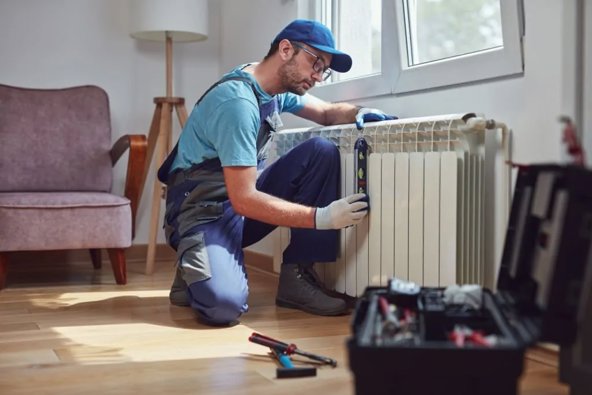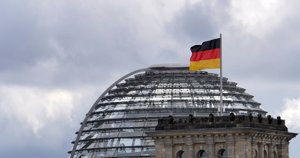
Heating Law Faces Reform in Germany
A technician checks a home radiator. Germany’s “heating law,” a set of building energy regulations, aims to phase out old oil and gas heaters in favor of cleaner systems powered largely by renewable energy.
Two years after Germany’s parliament passed a contentious update to the Building Energy Act – widely known as the “heating law” – the new government is moving to revise or replace it. The law, approved in September 2023 amid heated public debate, sought to make home heating more climate-friendly by gradually swapping out oil and gas boilers n-tv.de. It mandated that newly installed heating systems use at least 65% renewable energy, a rule initially applied only to new housing developments n-tv.de. While existing functioning heaters could keep running, the long-term goal was to transition buildings toward carbon-neutral heat by mid-century. Implementing this policy proved fraught, however, stirring intense controversy and even open disagreements within the former governing coalition.
Climate-Friendly Heating Mandate Provokes Debate
The 65% renewable requirement – essentially pushing technologies like electric heat pumps over fossil-fuel systems – was the centerpiece of the 2023 law n-tv.de. The reform took effect in January 2024, aiming to cut emissions from buildings, which account for a significant share of Germany’s CO2 output. Homeowners in new developments have since been required to install heating that predominantly uses green energy sources cleanenergywire.org n-tv.de. In practice, this often means opting for heat pumps, geothermal systems or biomass boilers instead of traditional gas or oil furnaces. To guide the shift in existing neighborhoods, the law tied future requirements to municipal heat planning: cities and towns are expected to draw up local heating infrastructure plans (in larger cities by mid-2026, smaller municipalities by 2028) that will inform residents whether they can hook into a district heating network or should pursue other solutions n-tv.de.
Despite its climate intent, the heating law quickly became one of the most disputed policies of the previous center-left “Ampel” government. Few other measures triggered such public outcry and political infighting n-tv.de. Critics argued the rules were rushed and overly complex, sparking fears among homeowners about costly upgrades. Even within the ruling coalition of Social Democrats, Greens, and Free Democrats, disagreements over the law’s details led to a very public spat before its passage. The law was derided by some media as a “heat hammer,” and support for the Greens’ economy minister Robert Habeck – the law’s chief proponent – suffered amid the backlash focus.de. In response to the criticism, lawmakers built in numerous exceptions and a phase-in period, but confusion persisted. As a result, many homeowners adopted a wait-and-see attitude, and sales of heat pumps fluctuated with the shifting signals from Berlin cleanenergywire.org.
New Coalition Pledges a “Technology-Open” Reform
Germany’s new governing coalition – formed by the conservative CDU/CSU and the center-left SPD after a snap election – has vowed to take a different approach. In their coalition agreement, the partners bluntly state: “We will abolish the heating law.” Instead, they promise a new version of the Building Energy Act that is more technology-open, flexible and simple, making the achievable CO2 reductions the key benchmark n-tv.de. This suggests the focus will shift away from one-size-fits-all mandates toward allowing diverse technical solutions as long as they effectively cut emissions n-tv.de.
Officials say the intention is not to abandon climate goals, but to reset the policy with better public acceptance. “It’s our responsibility to put the debate back on productive tracks and not repeat last legislature’s mistakes,” argued SPD lawmaker Armand Zorn, who serves as deputy parliamentary leader cleanenergywire.org n-tv.de. Zorn emphasizes that the heating sector – accounting for roughly 40% of Germany’s CO2 emissions – remains central to meeting climate targets, so the Building Energy Act will stay as a key tool n-tv.de. However, he and his colleagues believe the previous approach alienated too many people. The new government’s economic and energy ministry (now led by a CDU minister) has summarized its goal as ensuring “acceptance of efficiency measures” and avoiding over-regulation, according to a spokeswoman n-tv.de
. So far, no detailed draft of the revised law has been released n-tv.de. The coalition, which took office several months ago, is under pressure to act fast – Germany must also implement updated EU building energy-efficiency directives by May 2026, a deadline that looms on the horizon n-tv.de. The ministry aims to present a proposal by the end of this year t-online.de, potentially combining the new German rules with the European requirements. The balancing act is delicate: during the election campaign, CDU leader (now Chancellor) Friedrich Merz and CSU leader Markus Söder fiercely attacked the old heating law and promised to scrap it t-online.de. At the same time, the coalition has reaffirmed Germany’s binding commitment to climate neutrality by 2045, which means any “softer” replacement policy must still ensure that oil and gas heating are phased out in the coming two decades t-online.de. This has led observers to predict that while the name of the law might change, its ultimate effect – moving Germany away from fossil-fuel heating – will likely remain in some form t-online.de.
65% Renewable Rule at the Center of Revisions
The 65% renewable energy mandate for new heating systems (enshrined in Paragraph 71 of the current law) is widely seen as the crux of the controversy and a prime target for reform n-tv.de. Critics argue that this rule, as implemented, effectively forces homeowners’ hands on technology. Andreas Lenz, the energy policy spokesman for the CDU/CSU parliamentary group, says the existing law’s “very detailed and complex regulations” demonstrate a bias against certain heating methods n-tv.de. “They breed a lot of skepticism toward numerous heating supply options and discriminate against individual technologies,” Lenz contends n-tv.de. In practice, although the law permits alternatives (like biomass or hydrogen-ready boilers) if they can meet the 65% renewable threshold, many conservatives feel it de facto funnels people toward electric heat pumps as the only realistic solution. CDU’s new economics minister Katherina Reiche has criticized what she calls the “compulsion to [install] heat pumps” embedded in the policy n-tv.de.
On the other hand, supporters of the climate mandate note that the law does allow multiple compliance pathways – including district heating, geothermal, solar-thermal, biomass (wood pellet) systems, or even gas boilers that are later converted to run on green hydrogen n-tv.de. They argue the 65% rule simply sets an environmental standard, without dictating a single technology. Armand Zorn (SPD) insists that the 65% renewable requirement should remain in any new legislation n-tv.de. “Rolling back that target would jeopardize the goal of climate neutrality in the building sector,” he warns n-tv.de. Zorn and others stress that the law can be made more flexible in its implementation, but the ambition – that new heating systems be largely climate-friendly – must stay. Kerstin Andreae, head of the German Energy and Water Association (BDEW), agrees the 65% benchmark should not be dropped. Without holding rigidly to exactly 65% in every case, it must be clear that Germany’s buildings need to be nearly emissions-free by mid-century, Andreae saysn-tv.de
Both coalition partners now repeatedly emphasize “technology openness.” In practical terms, this means homeowners should have multiple options to meet climate goals. “Different solutions like heat pumps, geothermal, biogas, pellet heating or other innovative technologies must all be equally possible,” Zorn explains – “what matters is the climate-friendly result, not the specific technology.”n-tv.de. The planned reform will aim to encourage any heating system that can significantly cut CO2, rather than appearing to favor one mode of heating. At the same time, the law is expected to be trimmed of excessive bureaucracy. “Pragmatic and as simple as possible” is the mantra coming from coalition lawmakers about the new design n-tv.de
Calls to Simplify and Clarify the Rules
One lesson from the saga so far is that clarity and practicality are crucial. The energy industry and consumer groups are urging the government to make the rules more straightforward. “It needs to be shortened and clearly worded so that even private homeowners can understand the law,” says BDEW chief Kerstin Andreae, calling for a more “practicable” and user-friendly approach n-tv.de. For owners of older houses in particular, there should be individual solution options with clear targets rather than blanket prescriptions, she adds n-tv.de. Many Germans were bewildered by the initial law’s complexity – a mix of percentage requirements, exemptions, and timelines tied to local plans. This complexity fed public skepticism, as Lenz noted, and gave an impression that some technologies (for example, wood-pellet heating or certain gas solutions) were unfairly penalized n-tv.de.
The government appears to heed these concerns. Any new draft will likely be written in plainer language with fewer sub-clauses, aiming to rebuild public acceptance. The energy ministry has emphasized avoiding “overregulation” and focusing on measures that citizens can realistically implement n-tv.de. Restoring planning security for homeowners and the heating industry is seen as urgent – after months of seesawing messages, both need a stable framework in which to plan investments n-tv.de. Indeed, industry data show that Germany’s heating market slowed sharply in early 2025 amid the uncertainty n-tv.de. Heat pump sales, for example, fell nearly 50% at one point due to confusion around the law and delays in municipal heat plans cleanenergywire.org. Industry groups warn that continued policy whiplash could undermine the country’s climate goals while also hurting businesses and installers n-tv.de. Clear and consistent rules – arrived at through consensus rather than constant political fights – are widely seen as the remedy to get the heat transition back on track.
Generous Subsidies Under Scrutiny
Beyond the regulatory mandate, financial incentives are the other pillar of Germany’s heat transition strategy. To help homeowners shoulder the cost of new heating systems (which can run tens of thousands of euros), the previous government introduced generous subsidies. At present, switching from an old oil or gas heater to a qualified climate-friendly system can be subsidized up to 70% of the cost by the state, depending on various bonuses n-tv.de. This maximum support is achieved through a combination of a base grant (30% of costs), a “climate speed” bonus of 20% for prompt replacement, and an additional 20% income-based bonus for lower-income households (those with annual household income below €40,000) n-tv.de. In total, homeowners can receive as much as €21,000 towards a heating system replacement under the current rules n-tv.de. Importantly, this aid is structured as a reimbursement after installation – one must apply before the retrofit begins, pay for the work upfront, and then claim the subsidy upon completion and inspection n-tv.de.
However, these subsidies are now in question as the new government looks for budget savings. Leading voices in the CDU/CSU, such as Bavarian premier Markus Söder, argue that Germany’s strained federal finances can no longer sustain such lavish grants n-tv.de. Instead of tax hikes to fund climate programs, cuts to the heat pump subsidy budget have been floated n-tv.de. CSU General Secretary Martin Huber suggested “dialing down the incentives” and redesigning aid in a “smarter” way n-tv.de. One idea backed by some in the coalition is to replace direct subsidies with tax write-offs for higher-income households: wealthier homeowners would still be encouraged to go green but via tax credits or deductions rather than cash grants n-tv.de. This, proponents say, could reduce government outlays while still incentivizing upgrades. Middle- and lower-income families, on the other hand, might continue to receive direct support, albeit potentially at adjusted rates.
The SPD side agrees that the subsidy program should be revisited but insists on a means-tested approach n-tv.de. Social Democratic lawmakers like Matthias Miersch have called for targeting aid more toward those who truly need help affording a new heating system. “Many households are overburdened by the large upfront investments required for a heating replacement,” notes Armand Zorn of the SPD. “It’s crucial to support as much as necessary – but without overstraining the public coffers,” he says n-tv.de. Zorn has advocated a more “socially staggered” funding scheme, wherein affluent homeowners receive less state support while low-income households might even receive more, ensuring fairness n-tv.de. The challenge for the coalition will be finding the right balance that saves money without chilling the market for clean heating. Andreas Lenz (CSU) believes the subsidy regime can indeed be made “smarter” and gradually scaled back without killing demand n-tv.de. “Over time, we can phase out the incentives,” Lenz says, suggesting that as clean technologies become cheaper and more widespread, subsidies can be reduced n-tv.de. He proposes that high earners transition from subsidies to tax deductions, which would naturally lower the payout amounts n-tv.de
Industry Urges Caution to Maintain Momentum
Manufacturers and installers in the heating industry are watching these discussions closely – and somewhat nervously. They caution that if government support is slashed too abruptly, homeowners might simply stick with old heating systems, causing the nascent market for modern climate-friendly heaters to collapse n-tv.de. The stakes are high: Germany needs a steep increase in replacement of fossil-fuel boilers with low-carbon alternatives to hit its climate goals. A slowdown in adoption not only risks those targets but could also deal a blow to local businesses. “If the adjustment of incentives is fumbled, demand for climate-friendly heating could break down,” an official from the German Heating Industry Association (BDH) warned – which would harm climate targets and domestic manufacturers and tradespeople n-tv.de
Industry representatives underscore that stable, reliable incentives are essential for planning security. The existing subsidy programs have been instrumental in accelerating the switch to efficient, modern heating technologies “especially those based on renewable energy,” the BDH notes n-tv.de. They credit these programs with helping to establish heat pumps and other eco-friendly systems in the market and with saving millions of tons of CO2 emissions to daten-tv.de. For many consumers, however, installing a new heating system remains a major financial challenge. This is why industry and consumer advocates alike argue that some form of support must continue for the foreseeable future. “Reliable incentives remain crucial to give people planning security and to not further unsettle households,” the heating industry association insists n-tv.de. As the government works on its reform, finding a compromise that maintains momentum on green heating without sparking public backlash or breaking the budget will be a key test. The coming months will reveal what “replacement” for the heating law the black-red coalition can craft – and whether it can satisfy both the climate imperative and homeowners concerns.
Sources: German media reports and officials’ statements n-tv.de n-tv/dpa n-tv.de Clean Energy Wirecleanenergywire.org focus.de t-online.de






